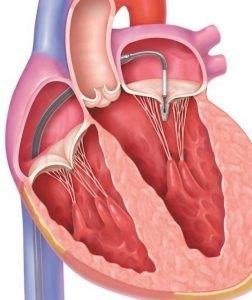By Dr. Aneley Yegezu Hundae, M.D., FACC
 Valvular heart disease is when any valve in the heart is damaged or is diseased. There are several causes of valve disease.
Valvular heart disease is when any valve in the heart is damaged or is diseased. There are several causes of valve disease.
• The normal heart has four chambers (right and left) atria, and the right and left ventricles) and four valves.
• The mitral valve allows blood to flow from the left atrium to the left ventricle.
• The tricuspid valve allows blood to flow from the right atrium to the right ventricle.
• The aortic valve allows blood to flow from the left ventricle to the aorta.
• The pulmonary valve allows blood to flow from the right ventricle to the pulmonary artery.
These valves open and close to control or regulate the blood flowing into the heart and then away from the heart.
Healthy heart valve leaflets can fully open and close the valve during the heartbeat, but diseased valves might not full open and close. Any valve in the heart can become diseased, but the aortic valve and mitral valve are commonly affected.
Diseased valves can become “leaky” where they don’t completely close; this is called regurgitation. If this happens, blood leaks back into the chamber that it came from, and not enough blood can be pushed forward through the heart.
The other common type of heart valve condition happens when the opening of the valve is narrowed and stiff and the valve is not able to open fully when blood is trying to pass through; this is called stenosis.
If the heart valves are diseased, the heart can’t effectively pump blood throughout the body and must work harder to pump, either while the blood is leaking back into the chamber or against a narrowed opening. This can lead to heart failure and death.
• About 2.5% of the USA population has valvular heart disease, but it is more common in older adults. About 13% of people born before 1943 have valvular heart disease.
• Nearly 25,000 deaths in the USA each year are due to heart valve disease from causes other than rheumatic disease.
Causes of Valvular Heart Disease:
Valvular heart disease can be caused by congenital conditions (being born with it), infections, degenerative conditions (wearing out with age), or they may be caused by other types of heart diseases such as coronary artery heart diseases or cardiomyopathy, (both conditions are know to cause leaky mitral valve).
Aortic and Mitral valve commonly affected, and hence we will focus on those two valves.
Aortic valve stenosis (AS) is a condition when the aortic valve doesn’t open well. This can lead to shortness of breath, chest pain and passing out. Aortic valve regurgitation (AR) on the other hand is when the aortic valve leaks. This can also lead to shortness of breath.
Mitral valve regurgitation (MR) is when the valve leaks. Mitral valves stenosis is when the valve is narrow. They both can cause shortness of breath. Mitral regurgitation is much more common in the US than Mitral stenosis. Mitral valve stenosis nowadays is becoming less common as it was typically associated with Rheumatic heart disease.
Rheumatic heart disease has decline significantly in the western world eventhough it continues to be a major public health concern in the developing world.
Fortunately in the last few years, minimally invasive innovative treatments have emerged addressing those two valvular diseases.
Transcatheter aortic valve replacement (TAVR) is a minimally invasive procedure to replace a narrowed aortic valve that fails to open. In this procedure a doctor inserts a catheter in your groin to replace the aortic valve without cutting your chest open. Often times you will be able to go home the next day and resume regular activities.
Mitral Clip is another minimally invasive treatment available for the leaky mitral valve. In this procedure, a doctor inserts a catheter in your groin and goes up in your heart to deliver a clip to the mitral valve that makes the leak less. Usually the patient in able to go home the next day.
If you have valvular heart disease, you can reach out to Port Charlotte Cardiology. Port Charlotte Cardiology, partnering with Riverview Cardiac Surgery (Dr. Golino Group), can help you get the treatment you need at your doorstep.
Port Charlotte Cardiology
3161 Harbor Blvd, Suite A, Port Charlotte, FL 33952
(941) 235-8892
www.portcharlottecardiology.com
Reference:
https://www.cdc.gov/heartdisease/valvular_disease.htm







